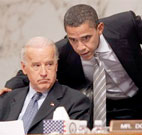 |
Politico...
The debt-ceiling
talks: 5 scenarios
By Carrie Budoff Brown and Glenn Thrush
May 2, 2011
It’s got to get done one way or another. Or so everybody says.
With the nation due to shatter its debt ceiling later this month,
legislators in both parties are strategizing on ways to seal a deal to
extend the ceiling on the best possible terms.
The possible scenarios for a resolution — or collapse — are
ridiculously complicated, made even more so by the Obama
administration’s desire to strike a “grand bargain” that cuts the
deficit by $4 trillion over the next dozen years with a combination of
budget cuts, changes to entitlement programs and, most controversial,
tax hikes for the rich.
As if that weren’t befuddling enough, the Senate’s bipartisan Gang of
Six could release its own plan for deficit reduction within days.
“Anyone who says they know how it could end is wrong,” said former
Republican Rep. Vin Weber of Minnesota, a onetime ally of former
Speaker Newt Gingrich. “At the end of the day, they will still pass an
increase of the debt ceiling. [But] I think we’ll go through a period
of market volatility leading up to it. ... It’s going to be a roller
coaster ride.”
High-level bipartisan talks, led by Vice President Joe Biden, are
scheduled to start Thursday. Here are five scenarios of what lies ahead:
Trigger happiness
President Barack Obama did not insert the concept of a debt “trigger”
into his mid-April deficit speech for nothing. The mechanism, backed by
many Republicans, would automatically kick in if the country’s
debt-to-GDP ratio soars too high.
According to an administration official, “It can provide a basis for a
deal,” — a view echoed by a GOP aide who called the idea “a good start.”
In concept, it’s the ideal compromise, but in practice, it could turn
out to be the biggest obstacle to a deal. Democrats want the trigger to
include budget cuts to all departments, possibly even defense, and some
kind of revenue enhancements in the form of tax hikes and the closing
of loopholes for wealthy taxpayers or corporations.
Republicans, with a few exceptions, such as Oklahoma Sen. Tom Coburn,
who has not ruled out raising more revenue, say any kind of tax
increase will stifle economic growth and is a nonstarter.
The way out of that box, according to Jim Kessler of Third Way, is to
sell the trigger as something that would never be used — an
in-case-of-emergency measure so vile it would force congressional
action before it would ever be deployed.
“The trigger is the only game in town,” said Kessler, a former
Democratic congressional staffer. “Republicans might go for it because
they could tell their supporters it would never be used — and that the
fear of having to raise taxes would push everybody, Democrats and
Republicans, to accept even deeper budget cuts.”
Hell no! (Then yes)
Many House freshmen and some veteran Republicans eager to dance to the
tea party beat ran explicitly against hiking the debt limit, so getting
the 218 votes in the House will most likely result in some GOP
defections.
One possible solution that no sane member or staffer will discuss
publicly is a scenario similar to the first TARP vote in late 2008,
which failed. That would mean an initial vote against raising the
ceiling that would (hopefully) deliver a momentary jolt to the bond and
stock markets.
That pressure, or so the reasoning goes, would give political cover to
fiscal hawks forced to vote yes in a second vote or face the
possibility of a national default.
Most of those close to the situation say this scenario is unlikely but
not out of the question. House Speaker John Boehner (R-Ohio) won’t
willfully submit a vote to the floor without a good chance of passage.
But the political crosscurrents — second thoughts about the paucity of
cuts posed a fleeting but real threat to the 2011 budget — could sweep
many Republicans into the “no” column.
“That’s a possibility. It’s an undesirable possibility,” said Weber.
“Remember what happened after the TARP vote failed. Markets don’t
necessarily interpret things the way Washington insiders do.”
Trading time for money
The White House, at first, hoped for a “clean” debt bill; a straight
up-or-down vote. When that possibility became less likely, it set up
the Biden process, hoping to craft a broad fiscal “framework” for
deficit reduction so that the nitty-gritty negotiations would be over
the fiscal 2012 budget.
The chances of either scenario coming to fruition are fast diminishing,
administration and Hill Democrats now concede.
Read the rest of the story at Politico
|

